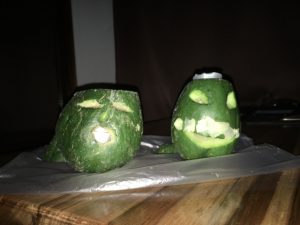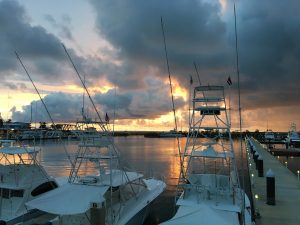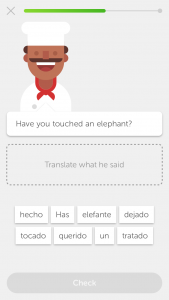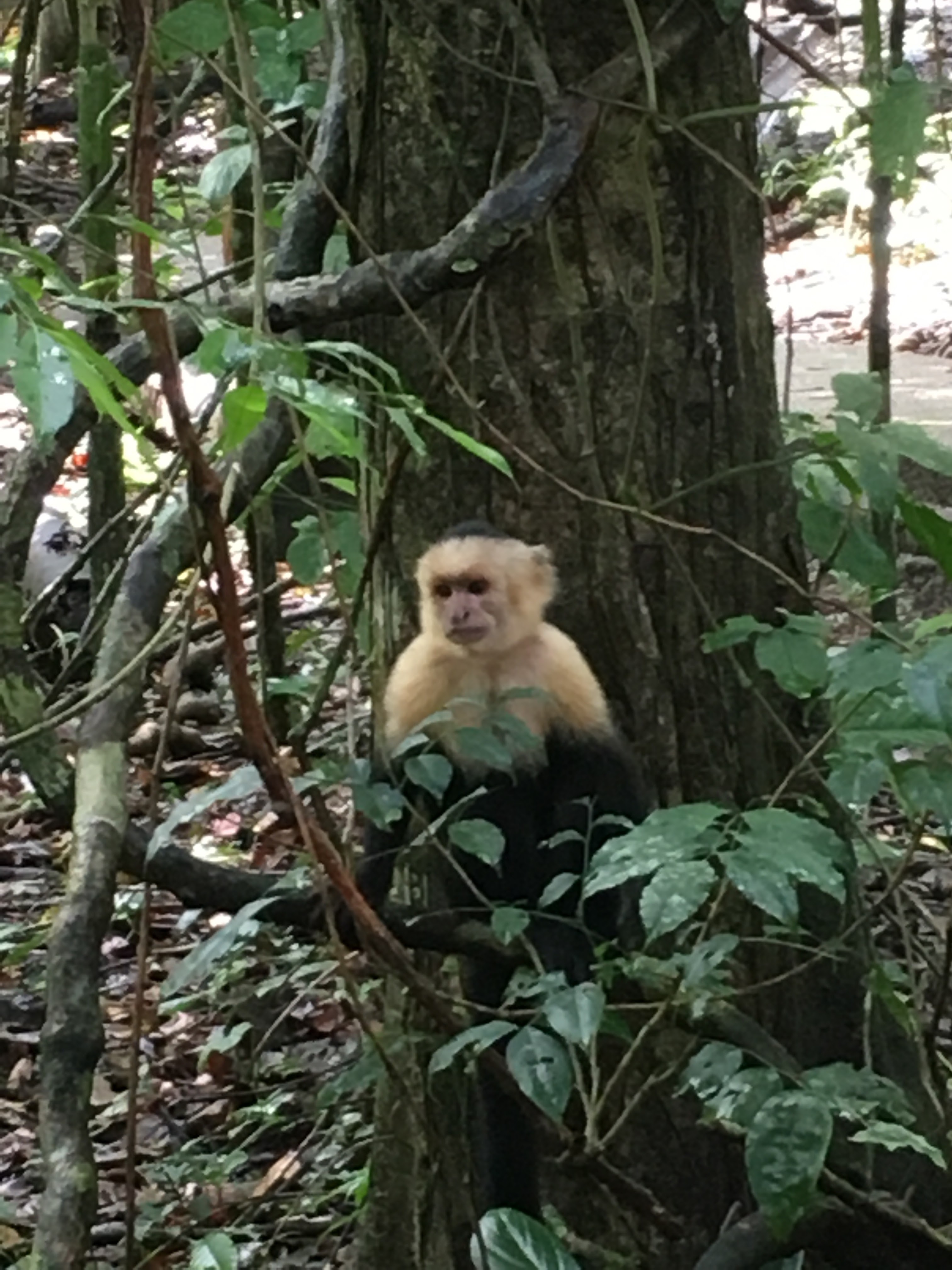As mentioned in Semana Uno, Ramona and I looked to return to Manuel Antonio for a bit of a long haul. We had booked a place above a bar/restaurant seated at the edge of a cliff, with a balcony overlooking the ocean. What could go wrong?
Living away from “home” for more than just a fleeting vacation moment is one of experiences that attracted me to our yearlong adventure abroad. When on vacation, time seems to fly by. When living hundreds or thousands of miles away from home, time seems to relax. One settles and builds their own customs and routines, and starts a new temporary home and life. For the two of us, this new life included:
- Visiting the local market in Quepos on Saturday’s to stock up the refrigerator and pantry with fresh, delicious limónes (limes), piñas (pineapples), maracuyás (passion fruit), and more.
- Buying a slow cooker, ordering cuts of meat from a nearby butcher shop, and cooking meals for the week.
- Exercising via a hilly hike down to the beach, a 7-minute workout in the apartment, or a yoga session that may or may not get interrupted by capuchin monkeys.
- Staying in on Halloween to catch Stranger Things on Netflix, after carving chayote jack o’lanterns (it was the best we could do, no encontramos unas calabazas – we could not find any pumpkins).

- Showing friends the local color, the amazing wildlife in Manuel Antonio National Park, and the enticing sunsets when they come to visit from los Estados Unidos.
- Getting a haircut (corte de pelo) without speaking any English. Hint: learn some of the basic translations in Spanish, use hand gestures liberally, and as a backup plan, bring a photo that represents some semblance of the look you’re going for.
While growing up and living in the midwest, I have certainly run into my share of harsh and unforgiving weather (I’m looking at you, snow-covered Marquette, MI!). However, I had experienced nothing like I did during our stint in Manuel Antonio.
During this time, the slice of Costa Rica we called home and its nearby surroundings were hit hard by the elements. First, Tropical Storm Nate (which was soon to be Hurricane Nate in the US) hit the country hard, knocking out power, causing landslides, and destroying roads and homes. Our rented apartment, with a balcony that virtual floated over the ocean, took a beating, and the bar/restaurant we lived above had to deal with water damage and make emergency roof repairs before reopening. We were fortunate to have to deal only with power outages and minor leaking in our quarters. Some locals we knew had family members who were displaced due to damages from the storm.
Later in our stay, hours after over 450 people were killed in an earthquake that rocked Iran and Iraq, a magnitude 6.5 earthquake hit north of us off the coast of Jacó, causing power outages and a few deaths, alongside mudslides and damage. Never having experienced an earthquake, the sense of feeling the floor move under my feet, the lights and power going out a few minutes later, and the subsequent aftershocks that made me doubt my equilibrium was sure a memorable experience.
I should add though, that the power went out in town somewhat regularly during our stay, though never for as long as immediately after the earthquake. This might typically happen in the early or late evening, and sometimes as a result we would just see restaurants and businesses shutter their doors for the night. Ramona and I usually took this as our cue to light a few candles and just chat, or read a book by Kindle-light until the power returned (what an age we live in). If this occurred in the US most folks I think would be fairly incredulous, but it rapidly became an event the two of us just understood would happen when we would least expect it.
It is difficult to explain in writing how immersive the wildlife is in Manuel Antonio. Whether it was monkeys scrambling across trees and cables, huge iguanas hanging out on rooftops, or macaws squawking loudly outside our balcony, I can count on one hand the number of days during our stay that were absent of interesting wildlife, and this is not even counting trips to the national park. The gallery below pares down probably a thousand photos to an amount suitable for consumption; the “highlights” of this part of the trip.
Storms, earthquakes, and animals aside, easily the coolest experience in this spell in Manuel Antonio was participating in a language exchange as part of a quest to improve my Spanish skills. Ramona scoured online and local classifieds to find a native Spanish speaker that could work with me in exchange for my aid to them in English. Fortunately we found one quickly in Quepolandia. We exchanged WhatsApp messages with Napoleon and agreed to meet up with him a couple of nights later at a dockside bar in nearby Quepos.

The purpose of a language exchange is to pit native speakers in different languages face-to-face, and to have them communicate and converse without necessarily having a specific agenda. This method can provide improved oral skills for both participants versus other methods of practice, and I was looking forward to supplementing the frequent Spanish work I had been doing, practicing solo, or performing language exercises with Ramona. To experience such an exchange was a real treat. The biggest initial difficulty for me was the knowledge gap in the languages we were learning. As Napoleon spoke to me after our initial greetings, it was clear he was far more advanced in English than I was in Spanish. Ramona, being fluent in both languages, and familiar with the constructs of language exchanges, was right at home sitting between two people trying to decide how to communicate to each other and what to communicate about. If prior to this meeting I was over-confident in my growing Spanish abilities, that would no longer be the case. If reading a sign or menu, or being spoken to simply and slowly within a specific context, I was able to parse some Spanish sentences or words, understand them to a basic degree, and slowly formulate a response. When participating in a fluid conversation in Spanish that could be devoid of structure and context, as expected, I would flounder.
Every week Ramona and I would invite Napoleon to our residence to chat and practice in Spanish and English, while Ramona would whip up a dish that would blow us away (I don’t think most Ticos are used to having chicken slow-cooked with maracuyá sauce). To sit across from someone and have them share stories, metaphors, and slang in Spanish, proved to be a much richer experience than answering this pregunta in Duolingo:

On some weekends the two of us would join up with Napoleon and his wonderful wife Leslie for dinner, a trip to the beach, or a night out on the town. It was these occasions that truly exemplified how we were living, and not just staying here on Costa Rica. Truly, we were fortunate to become close with such delightful people. Napoleon and I still chat and practice our Spanish and English over Skype regularly, and Ramona and I look forward to visiting our friends in person again when we return to the country in 2018.
But first, we jaunt back to the midwest for Thanksgiving. Bon voyage!



1 Comment